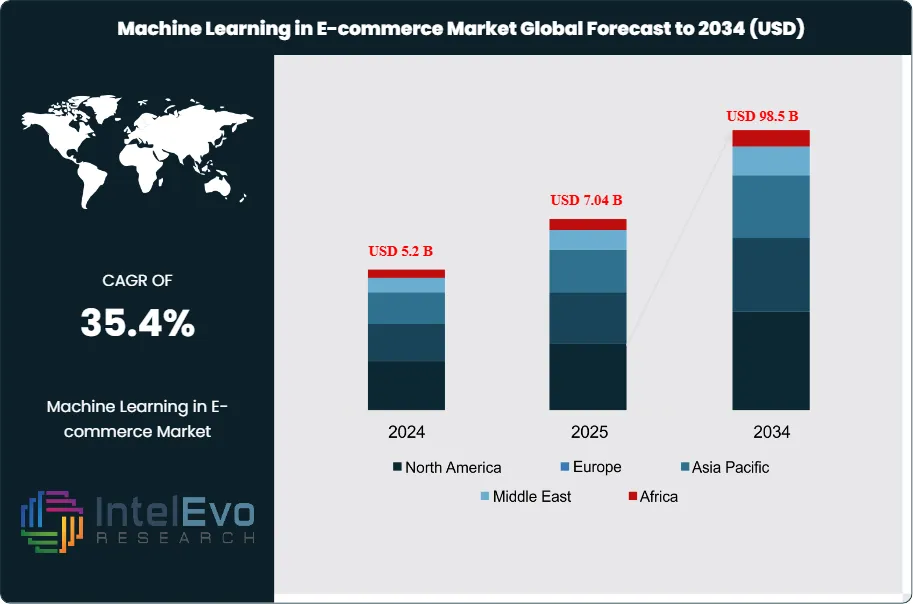
Machine Learning in E-commerce Market Size, Forecast | 35.4% CAGR
Global Machine Learning in E-commerce Market Size, Share, Analysis Report By Type(Unsupervised Learning, Supervised Learning, Reinforcement Learning), Deployment, Application(Customer Service Automation, Personalized Product Recommendations, Sentiment Analysis & Customer Feedback, Customer Churn Prediction, & Others), End-User Industry Region & Key Players-Industry Segment Overview, Market Dynamics, Competitive Strategies, Trends & Forecast 2025-2034
Report Overview
The Machine Learning in E-commerce Market size is expected to be worth around USD 98.5 billion by 2034, up from USD 5.2 billion in 2024, growing at a CAGR of 35.4% during the forecast period from 2025 to 2034. The rapid adoption of AI-driven personalization, predictive analytics, and intelligent search tools is transforming online shopping experiences worldwide. With e-commerce giants integrating ML for dynamic pricing, fraud detection, and customer behavior analysis, the sector is set for exponential growth. The rising demand for automation in online retail and the evolution of generative AI in commerce will continue to fuel innovation and reshape digital retail ecosystems globally.

Get More Information about this report -
Request Free Sample ReportMachine learning in e-commerce represents a transformative technology that leverages artificial intelligence algorithms to analyze vast amounts of customer data, predict behaviors, and optimize business operations across digital commerce platforms.
This rapidly evolving market encompasses various learning methodologies including supervised, unsupervised, and reinforcement learning techniques that enable businesses to deliver personalized customer experiences, optimize pricing strategies, and automate critical business processes. The market is characterized by increasing adoption of cloud-based solutions, growing demand for personalized shopping experiences, and the need for real-time data analysis to gain competitive advantages in the digital marketplace.
Several key factors are driving the growth of machine learning in e-commerce, including the exponential increase in online shopping activities, the need for sophisticated fraud detection systems, and the demand for intelligent inventory management solutions. The Machine Learning in E-commerce Market is estimated to reach USD 98.9 Bn By 2034, Riding on a Strong 36.6% CAGR during forecast period. The market is further influenced by the rising importance of customer sentiment analysis, the implementation of advanced chatbots for customer service automation, and the growing necessity for predictive analytics in supply chain optimization. Additionally, the integration of machine learning with emerging technologies such as augmented reality, voice commerce, and Internet of Things (IoT) devices is creating new opportunities for market expansion.
Regional Analysis: North America currently dominates the machine learning in e-commerce market, driven by the presence of major technology companies, high internet penetration rates, and substantial investments in AI research and development. The region benefits from advanced technological infrastructure, early adoption of machine learning technologies, and a robust e-commerce ecosystem supported by companies like Amazon, Google, and Microsoft. Asia-Pacific is emerging as a significant growth region, particularly due to the rapid digitalization of emerging economies and the increasing adoption of mobile commerce platforms.
COVID-19 Impact: The COVID-19 pandemic has significantly accelerated the adoption of machine learning in e-commerce as businesses faced unprecedented challenges in managing supply chains, predicting consumer behavior, and maintaining customer engagement during lockdowns. This chart shows us clearly the impact to global ecommerce revenues the pandemic has had, adding an additional 19% sales growth for 2020, and additional 22% sales growth to the existing 9% and 12% regular forecast sales growth rates, respectively. The pandemic forced retailers to rapidly implement AI-powered solutions for inventory management, demand forecasting, and contactless customer service, leading to accelerated digital transformation initiatives and increased investment in machine learning technologies.
Regional Conflicts and Trade Tensions: The ongoing regional conflicts and trade tensions between major economies, particularly the US-China trade disputes, have created both challenges and opportunities for the machine learning in e-commerce market. Tariffs on technology goods and restrictions on data sharing have compelled companies to diversify their supply chains and develop localized AI solutions. These geopolitical factors have led to increased investment in domestic AI capabilities, the development of region-specific machine learning models, and the establishment of data centers in multiple jurisdictions to ensure compliance with local regulations. Trade tensions have also accelerated the adoption of machine learning for supply chain optimization and risk management, as companies seek to mitigate the impact of uncertain trade policies on their operations.

Key Takeaways
- Market Growth: The Machine Learning in E-commerce Market is expected to reach USD 98.5 billion by 2034, due to the convergence of AI innovation, cloud scalability, and shifting consumer expectations toward personalization.
- Type Dominance: Supervised learning holds the dominant market share because it delivers highly accurate recommendations and predictions using labeled data. Its widespread applicability to personalized product suggestions, customer churn prediction, and fraud detection has made it indispensable for e-commerce operators.
- Deployment Dominance: Cloud-based deployment leads the market as it enables scalability, cost efficiency, and faster time to market. Cloud services make machine learning accessible to businesses of all sizes by eliminating the need for large upfront investments in infrastructure.
- Application Dominance: Personalized product recommendations are the most prominent application segment. Retailers are heavily investing in AI-powered recommendation engines to drive conversions, boost average order values, and improve customer loyalty.
- End-User Dominance: Online retailers constitute the largest end-user group, leveraging machine learning to compete with marketplaces and direct brands through enhanced customer experiences and operational efficiencies.
- Driver: The proliferation of transactional and behavioral data across online channels fuels machine learning adoption by enabling richer predictive models and deeper customer insights.
- Restraint: Data privacy concerns and regulatory restrictions present significant challenges, requiring e-commerce companies to redesign workflows and invest in compliance.
- Opportunity: Emerging markets, particularly in Asia-Pacific, offer vast untapped potential as e-commerce penetration accelerates and local businesses invest in AI to differentiate themselves.
- Trend: Explainable AI and transparency in machine learning models are gaining traction, as retailers seek to improve customer trust and meet compliance standards.
- Regional Analysis: North America leads the market due to its mature technology ecosystem and strong presence of leading vendors. Asia-Pacific is expected to record the fastest growth as e-commerce adoption and digital infrastructure improve rapidly.
Type Analysis:
Supervised Learning Leads With over 55% Market Share In Machine Learning in E-commerce Market. Supervised learning has become the cornerstone of machine learning deployments in e-commerce due to its ability to generate reliable, actionable predictions. In supervised learning, algorithms are trained on historical labeled data, enabling them to recognize patterns and make precise recommendations. This approach is extensively used in fraud detection, where historical transaction records are classified as fraudulent or legitimate, and in churn prediction models that estimate the likelihood of a customer leaving based on past behavior. Personalized product recommendations also heavily rely on supervised learning techniques such as regression and classification to suggest relevant products. The dominance of this segment reflects the high confidence businesses place in well-defined, deterministic models to deliver measurable ROI.
Deployment Analysis:
Cloud-based deployment dominates the market because it offers flexibility, scalability, and cost advantages over on-premises solutions. E-commerce companies can provision machine learning services quickly without incurring the capital expenditure associated with in-house infrastructure. Cloud providers such as Microsoft Azure, Amazon Web Services, and Google Cloud offer pre-built machine learning services, reducing the barrier to entry for small and medium-sized retailers. These platforms also enable rapid experimentation and scaling to handle seasonal demand spikes. Furthermore, cloud-based deployments facilitate collaboration across geographically dispersed teams, enabling agile development and faster rollout of AI-powered features.
Application Analysis:
Personalized product recommendations are the leading application within machine learning in e-commerce. As competition intensifies, offering tailored shopping experiences has become critical for customer acquisition and retention. Recommendation engines analyze clickstream data, browsing behavior, and purchase history to deliver highly relevant product suggestions. This personalization drives higher engagement, increased basket sizes, and stronger brand loyalty. Retailers are leveraging collaborative filtering, content-based filtering, and deep learning models to refine recommendations further. The importance of this segment is underscored by its direct impact on revenue growth and its role as a key differentiator in crowded digital marketplaces.
End-User Analysis:
Online retailers represent the largest end-user segment, deploying machine learning solutions to optimize nearly every aspect of their operations—from marketing to logistics. These businesses often face intense competition from marketplaces and DTC brands, motivating them to invest in AI-powered capabilities such as dynamic pricing, automated customer support, and inventory forecasting. Unlike B2B platforms or niche DTC brands, online retailers typically operate at scale, generating vast data volumes that fuel sophisticated machine learning models. Their dominance reflects both the scale of their operations and their commitment to using AI as a strategic lever for growth.
Region Analysis:
North America Leads With more than 35% Market Share In Machine Learning in E-commerce Market. North America maintains its leadership position in the machine learning in e-commerce market, accounting for the largest market share due to several key factors including technological advancement, substantial venture capital investment, and the presence of major technology companies. The region benefits from a mature e-commerce ecosystem with companies like Amazon, Google, and Microsoft driving innovation in AI technologies. The high internet penetration rate and advanced digital infrastructure provide a solid foundation for machine learning implementation. The region is also characterized by early adoption of emerging technologies and significant investment in research and development activities.
Asia-Pacific is emerging as the fastest-growing region, driven by rapid digitalization, expanding middle-class populations, and increasing mobile commerce adoption. Countries like China, India, and Southeast Asian nations are witnessing explosive growth in e-commerce activities, creating substantial opportunities for machine learning implementation. The region benefits from large consumer bases, growing internet connectivity, and government initiatives supporting digital transformation. Europe represents a significant market with strong regulatory frameworks and emphasis on data privacy, influencing the development of ethical AI solutions.
Looking ahead, the Asia-Pacific region is expected to witness the highest growth in machine learning applications, particularly in mobile commerce and social commerce segments. The region's young, tech-savvy population and increasing smartphone penetration create ideal conditions for AI-powered e-commerce solutions. The supervised learning segment is projected to experience significant growth across all regions, driven by the increasing availability of customer data and the need for predictive analytics in business decision-making.

Get More Information about this report -
Request Free Sample ReportMarket Key Segment
Type
- Unsupervised Learning
- Supervised Learning
- Reinforcement Learning
Deployment
- Cloud-based
- On-premises
Application
- Customer Service Automation
- Personalized Product Recommendations
- Sentiment Analysis and Customer Feedback
- Customer Churn Prediction
- Inventory Management and Demand Forecasting
- Price Optimization
- Fraud Detection and Prevention
- Other Applications
End-User
- Direct-to-Consumer (DTC) Brands
- Online Retailers
- B2B E-commerce Platforms
Region
- North America
- Latin America
- East Asia And Pacific
- Sea And South Asia
- Eastern Europe
- Western Europe
- Middle East & Africa
| Report Attribute | Details |
| Market size (2025) | USD 7.04 B |
| Forecast Revenue (2034) | USD 98.5 B |
| CAGR (2025-2034) | 35.4% |
| Historical data | 2018-2023 |
| Base Year For Estimation | 2024 |
| Forecast Period | 2025-2034 |
| Report coverage | Revenue Forecast, Competitive Landscape, Market Dynamics, Growth Factors, Trends and Recent Developments |
| Segments covered | Type (Unsupervised Learning, Supervised Learning, Reinforcement Learning); Deployment (Cloud-based, On-premises); Application (Customer Service Automation, Personalized Product Recommendations, Sentiment Analysis and Customer Feedback, Customer Churn Prediction, Inventory Management and Demand Forecasting, Price Optimization, Fraud Detection and Prevention, Other Applications); End-User (Direct-to-Consumer (DTC) Brands, Online Retailers, B2B E-commerce Platforms) |
| Research Methodology |
|
| Regional scope |
|
| Competitive Landscape | Sentieo, BigCommerce, WooCommerce (Automattic), Certona, SAP, Oracle, Bloomreach, IBM, Microsoft, Reflektion, Salesforce, RichRelevance |
| Customization Scope | Customization for segments, region/country-level will be provided. Moreover, additional customization can be done based on the requirements. |
| Pricing and Purchase Options | Avail customized purchase options to meet your exact research needs. We have three licenses to opt for: Single User License, Multi-User License (Up to 5 Users), Corporate Use License (Unlimited User and Printable PDF). |
Select Licence Type
Connect with our sales team
Machine Learning in E-commerce Market
Published Date : 11 Jul 2025 | Formats :Why IntelEvoResearch
100%
Customer
Satisfaction
24x7+
Availability - we are always
there when you need us
200+
Fortune 50 Companies trust
IntelEvoResearch
80%
of our reports are exclusive
and first in the industry
100%
more data
and analysis
1000+
reports published
till date







